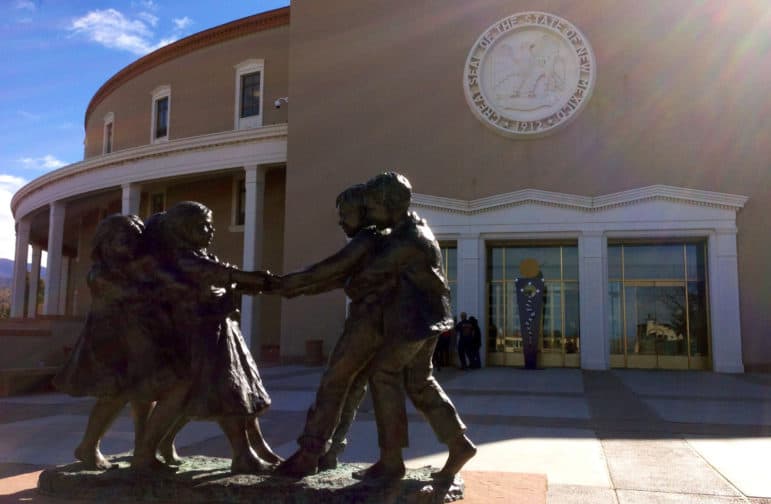
Heath Haussamen / NMPolitics.net
A statue outside the Roundhouse in Santa Fe.
When you’re driving at night through Counselor, N.M., on U.S. 550 the horizon takes on a dusky illumination, almost like daylight, Samuel Sage said during a Monday news conference in Santa Fe.
Bright light flares from natural gas being burned off as part of oil and gas production, which has become increasingly common in that area of Northwestern New Mexico, particularly since 2013, said Sage, a member of the Navajo Nation’s Counselor Chapter House.
Sage was among several environmental advocates who gathered at the state Capitol in support of a bill that, if passed, would create a four-year moratorium on any new state permits for hydraulic fracturing — a type of deep horizontal drilling that injects high-pressured fluid below ground.
The bill also outlines extensive reporting requirements for several state agencies related to the impacts of fracking.
“All we want is clean air and clean water,” Sage said.
It’s a drastic proposal for a state whose economy heavily depends on oil and gas, particularly at a time when the industry is booming and creating a financial windfall for New Mexico. But environmentalists say that is also why the legislation is critical now.
“I know this isn’t a real popular bill but it’s important,” said co-sponsor Sen. Antionette Sedillo Lopez, D-Albuquerque, citing low regulatory staffing and a lack of study of public health or environmental impact. “I have heard story after story about how fracking is impacting people but we don’t have any data.”
Robert McEntyre, a spokesman for the New Mexico Oil and Gas Association, called the bill “light on facts and science,” saying fracking has already been well studied and the bill’s backers failed to gain input from the industry and communities that support oil and gas development.
“As a whole, the legislation would be a disaster for New Mexico,” he said. “It would result in financial ruin. It would devastate economies in the southeast and the northwest.”
Sedillo Lopez, a freshman legislator, said she wants to provide more data and regulatory resources.
“After eight years of the Martinez administration gutting regulatory agencies, we have had very little chance to look at the impact of fracking,” she said referring to former Gov. Susana Martinez.
Beth Wojahn, a spokeswoman for the state Energy, Minerals and Natural Resources Department, which has primary responsibility for oversight of the oil and gas industry, said her department is reviewing the proposed legislation.
Fracking has been a source of community turmoil in various parts of the state. In the Four Corners region, environmentalists and tribal groups have been pushing back against federal efforts to lease Bureau of Land Management parcels for oil and gas development, saying federal land managers have failed to study how the specific processes used in fracking will impact the sensitive geologic and cultural landscape surrounding Chaco Culture National Historical Park.
And last year, a grassroots protest erupted in Sandoval County, where community organizers said county commissioners had introduced deliberately weak oil and gas development guidelines. The protesters said too little study had been done regarding how seismic activity and a pristine aquifer would be affected by fracking.
But Sage, who lives in Farmington, says requests for more scrutiny of oil and gas operations by state and federal regulators have until now fallen on deaf ears. Advocates hope Senate Bill 459 will find a more friendly audience from Democratic lawmakers, particularly with leadership from newly elected Gov. Michelle Lujan Grisham. The governor last week signed an executive order calling for New Mexico to adopt a strategy to combat climate change and reduce greenhouse gas emissions.
In addition to preventing the state from issuing any new permits for hydraulic fracturing, the legislation would require the energy and minerals agency to provide an annual report to the governor and legislators detailing the number of permits with active fracking, greenhouse gas “trends,” the status of funding for research to study fracking, and information on any environmental and agricultural impacts from fracking operations.
The bill also outlines public health reporting requirements related to fracking on behalf of the state Department of Health and from the Office of the State Engineer on the relationship between fracking and state waters. Further, the bill includes reporting requirements for the New Mexico Indian Affairs Department, and a reporting mandate regarding worker compensation claims related to injuries among workers involved with fracking.
The act would expire in 2023.
Co-sponsor Sen. Benny Shendo Jr., D-Jemez Pueblo, said, “We have to stand by our representatives, our senators as this goes to committee, as it gets questioned, and ridiculed and probably talked down to because, again, it’s a fight against our economy.”